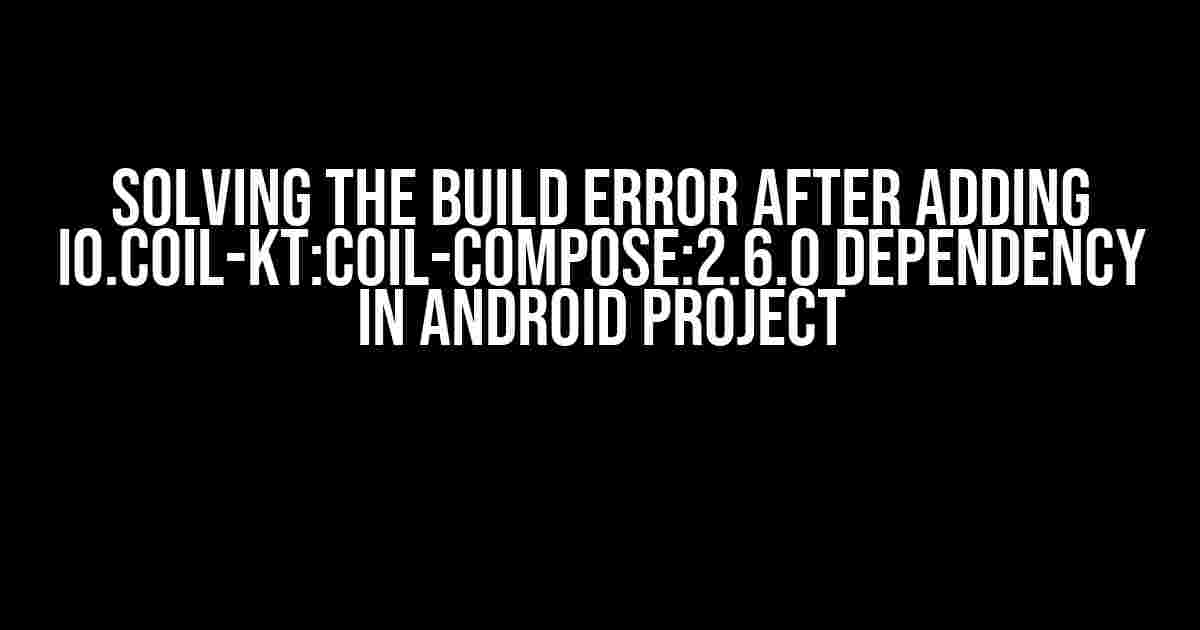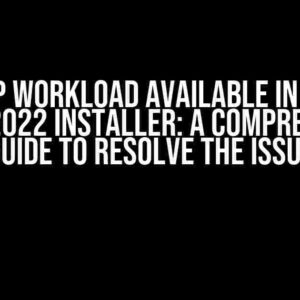Are you tired of banging your head against the wall trying to figure out why your Android project won’t build after adding the io.coil-kt:coil-compose:2.6.0 dependency? You’re not alone! This frustrating issue has plagued many developers, but fear not, dear reader, for we’re about to embark on a journey to conquer this pesky problem once and for all.
The Symptoms
Before we dive into the solution, let’s take a closer look at the symptoms of this build error. If you’ve encountered any of the following issues, you’re in the right place:
- Android Studio throws a build error after adding the io.coil-kt:coil-compose:2.6.0 dependency to your project.
- The error message is cryptic and unhelpful, leaving you feeling frustrated and confused.
- You’ve tried cleaning and rebuilding your project, but the error persists.
- You’ve searched high and low for a solution, but nothing seems to work.
The Cause
So, what’s causing this build error in the first place? The culprit behind this issue is often a mismatch between the versions of coil-compose and the Android Gradle plugin. When you add the io.coil-kt:coil-compose:2.6.0 dependency to your project, it expects a specific version of the Android Gradle plugin to be present. If this version is not compatible with the one you’re currently using, the build process will fail.
But Wait, There’s More!
In addition to the version mismatch, there are a few other factors that can contribute to this build error:
- Incompatible versions of Kotlin and Java.
- Mismatched Gradle plugin versions between modules.
- Unresolved dependencies or transitive dependencies.
The Solution
Enough chit-chat, let’s get to the good stuff! To fix this build error, you’ll need to follow a series of steps, which we’ll outline below. Don’t worry, it’s easier than you think!
Step 1: Check Your Gradle Plugin Version
Open your project’s build.gradle file and check the version of the Android Gradle plugin:
buildscript {
...
dependencies {
classpath 'com.android.tools.build:gradle:7.0.3'
}
}
In this example, the version is 7.0.3. Make a note of this version, as we’ll need it later.
Step 2: Update Your Coil-Compose Dependency
Next, update the version of the coil-compose dependency to match the Android Gradle plugin version. For example, if you’re using Gradle plugin version 7.0.3, you can use coil-compose version 2.1.0:
dependencies {
implementation 'io.coil-kt:coil-compose:2.1.0'
}
Update your build.gradle file accordingly.
Step 3: Check Your Kotlin and Java Versions
Ensure that your Kotlin and Java versions are compatible. You can check the version of Kotlin in your build.gradle file:
kotlin {
jvmToolchain {
languageVersion.set(JavaLanguageVersion.of(11))
}
}
In this example, the Kotlin version is set to 11. Make sure it matches the version of Java you’re using.
Step 4: Ensure Consistent Gradle Plugin Versions
If your project has multiple modules, ensure that the Gradle plugin version is consistent across all modules. You can do this by defining the plugin version in your project/gradle/wrapper/gradle-wrapper.properties file:
distributionUrl=https\://services.gradle.org/distributions/gradle-7.0.3-all.zip
Update the version to match the one used in your build.gradle file.
Step 5: Resolve Dependencies and Transitive Dependencies
Finally, make sure to resolve any unresolved dependencies or transitive dependencies. You can do this by adding the following code to your build.gradle file:
configurations {
all {
resolutionStrategy {
force 'io.coil-kt:coil-compose:2.1.0'
}
}
}
This will force the resolution of the coil-compose dependency to version 2.1.0.
Putting it all Together
Now that we’ve covered the steps to fix the build error, let’s summarize the solution:
| Step | Action |
|---|---|
| 1 | Check Gradle plugin version |
| 2 | Update coil-compose dependency version |
| 3 | Check Kotlin and Java versions |
| 4 | Ensure consistent Gradle plugin versions |
| 5 | Resolve dependencies and transitive dependencies |
Conclusion
And there you have it! By following these steps, you should be able to fix the build error that occurs after adding the io.coil-kt:coil-compose:2.6.0 dependency to your Android project. Remember to be patient and methodical, as resolving this issue requires a thorough understanding of the underlying causes.
Don’t let this build error hold you back from creating amazing Android apps. With this guide, you’ll be well on your way to resolving the issue and getting back to what matters most – building awesome apps!
Happy coding, and remember to stay calm and Gradle on!
Frequently Asked Question
Are you struggling with build errors after adding the io.coil-kt:coil-compose:2.6.0 dependency in your Android project? Don’t worry, we’ve got you covered! Here are some frequently asked questions and answers to help you resolve the issue:
Q1: What is the coil-compose dependency, and why is it causing build errors?
The coil-compose dependency is a popular Android library used for image loading and caching. It’s causing build errors because it has some compatibility issues with certain Android Gradle plugin versions. Don’t worry, we’ll help you fix it!
Q2: How do I resolve the “Duplicate class” error after adding the coil-compose dependency?
This error occurs because coil-compose includes some AndroidX classes, which might conflict with your existing dependencies. To resolve this, add the following code to your build.gradle file: `android { … compileOptions { sourceCompatibility = ‘1.8’ targetCompatibility = ‘1.8’ } }`. This should fix the duplicate class issue!
Q3: Why am I getting a “Could not find coil-compose-2.6.0.aar” error?
This error occurs because the coil-compose library is not properly downloaded or cached. Try cleaning and rebuilding your project by running the command `./gradlew clean build` in your terminal. This should fix the issue and download the required library!
Q4: How do I exclude transitive dependencies that are causing build errors?
To exclude transitive dependencies, you can add the `exclude` keyword in your build.gradle file. For example, if you want to exclude the AndroidX lifecycle dependencies, add the following code: `implementation (‘io.coil-kt:coil-compose:2.6.0’) { exclude group: ‘androidx.lifecycle’, module: ‘lifecycle-runtime’ }`. This should help resolve build errors caused by conflicting dependencies!
Q5: What if none of the above solutions work, and I’m still getting build errors?
If none of the above solutions work, try invalidating your cache and restarting Android Studio. You can also try downgrading or upgrading the coil-compose dependency version to see if that resolves the issue. If you’re still stuck, feel free to ask for more help or provide more details about your project, and we’ll do our best to assist you!


